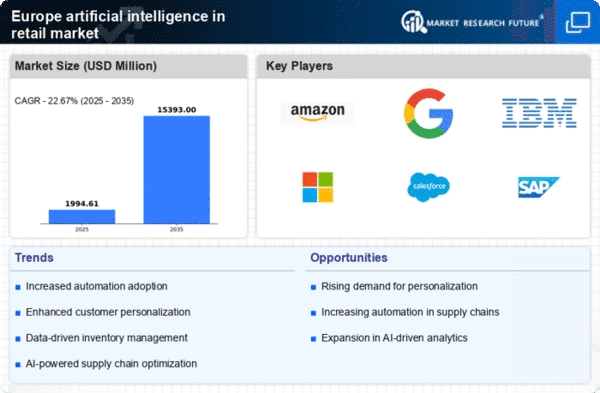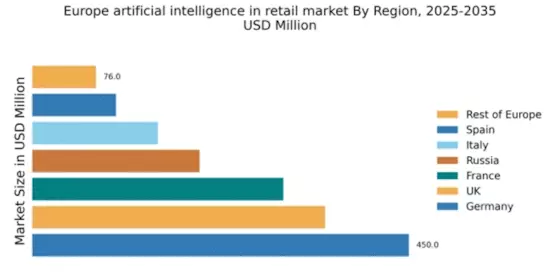Automation of Retail Operations
Automation is a key driver in the artificial intelligence-in-retail market in Europe, as retailers seek to streamline operations and reduce costs. The implementation of AI technologies, such as robotic process automation (RPA), is transforming traditional retail workflows. Reports indicate that approximately 30% of retail tasks are expected to be automated by 2026, significantly impacting labor dynamics. This shift allows retailers to allocate human resources to more strategic roles while enhancing productivity. Furthermore, automation contributes to faster service delivery, which is increasingly demanded by consumers. As retailers adopt AI-driven automation solutions, they are likely to see improvements in efficiency and customer experience, positioning themselves favorably in a rapidly evolving market.
Enhanced Data Analytics Capabilities
The artificial intelligence-in-retail market in Europe is experiencing a surge in demand for enhanced data analytics capabilities. Retailers are increasingly leveraging AI to analyze vast amounts of consumer data, enabling them to derive actionable insights. This trend is evidenced by a reported growth of 25% in AI-driven analytics tools among retailers in Europe. By utilizing these advanced analytics, businesses can better understand consumer behavior, preferences, and trends, leading to improved decision-making processes. The ability to predict customer needs and optimize inventory management is becoming crucial in a competitive landscape. As a result, the integration of AI analytics is not merely a trend but a necessity for retailers aiming to enhance operational efficiency and customer satisfaction.
Improved Customer Insights through AI
The artificial intelligence-in-retail market in Europe is being propelled by the need for improved customer insights. Retailers are utilizing AI technologies to gather and analyze customer feedback, purchasing patterns, and engagement metrics. This approach enables businesses to tailor their offerings and marketing strategies effectively. Recent studies suggest that retailers employing AI for customer insights have seen a 20% increase in customer retention rates. By understanding customer preferences and behaviors, retailers can create personalized shopping experiences that resonate with their target audience. This focus on customer-centric strategies is essential for maintaining competitiveness in the retail sector, as consumers increasingly expect brands to understand and cater to their individual needs.
Cost Reduction through AI Implementation
Cost reduction is a significant driver in the artificial intelligence-in-retail market in Europe, as retailers seek to enhance profitability. The implementation of AI technologies can lead to substantial savings in various operational areas, including supply chain management and customer service. For instance, AI-driven chatbots can handle customer inquiries, reducing the need for extensive customer service teams. Reports suggest that retailers can save up to 20% in operational costs by adopting AI solutions. Additionally, AI can optimize inventory levels, minimizing excess stock and associated holding costs. As retailers continue to face pressure to maintain margins, the strategic use of AI for cost reduction is likely to become increasingly prevalent, shaping the future of the retail landscape.
Integration of AI in Omnichannel Strategies
The integration of artificial intelligence into omnichannel strategies is becoming a pivotal driver in the retail market across Europe. Retailers are recognizing the importance of providing a seamless shopping experience across various channels, including online and brick-and-mortar stores. AI technologies facilitate this integration by enabling real-time inventory management and personalized marketing across platforms. Data indicates that retailers with robust omnichannel strategies are likely to achieve a 30% higher customer satisfaction rate. As consumers continue to shift between channels, the ability to deliver consistent and personalized experiences is crucial. Consequently, the adoption of AI in omnichannel approaches is expected to grow, enhancing customer loyalty and driving sales.

















